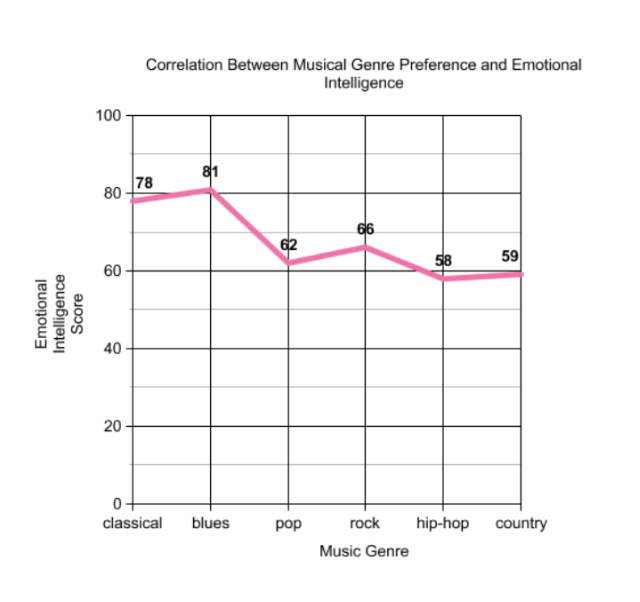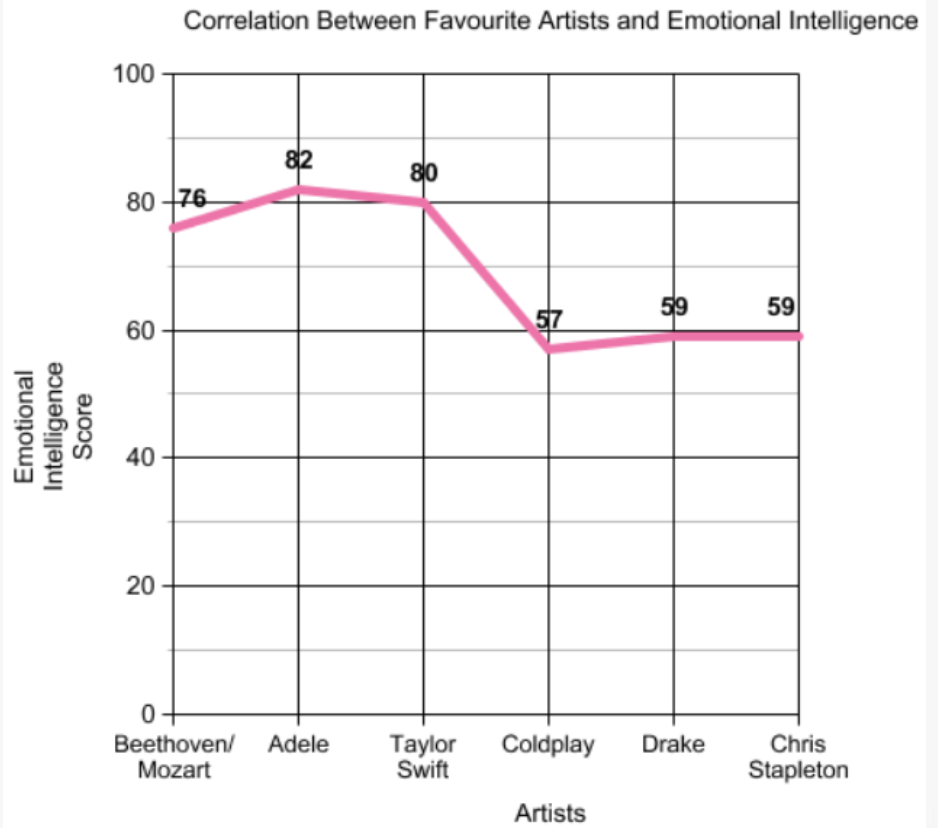exploring the correlation between musical preference and emotional intelligence

This study delves into the connection between individuals’ music preferences, and their emotional intelligence (EI) scores. Its primary objectives encompass surveying participants about their music tastes and evaluating their EI using the Psychology Today Emotional Intelligence Test. The methodology encompasses the distribution of surveys and tests, followed by a data analysis aimed at unveiling potential correlations between specific music genres or artist preferences and varying EI scores. The outcomes offer insights into the interplay between music preferences and the development of emotional intelligence, highlighting the pivotal role of music in the development of EI.
Introduction:
At the core of this study lies a pivotal research inquiry: Does a correlation exist between an individual’s music preferences and their emotional intelligence scores? Through the administration of a survey and an emotional intelligence test, we aim to explore potential connections between musical taste and the development of emotional intelligence.
Emotional intelligence (EI) stands as a multifaceted construct, encompassing the capacity to not only recognize and understand emotions in both oneself and others but also to manage and harness these emotions. It has become a prominent focus of study in the realms of psychology and various life domains, owing to its relevance in shaping interpersonal relationships, fostering workplace achievement, bolstering mental well-being, and contributing to overall life satisfaction. Researchers have dissected EI, identifying its vital components, including emotional awareness, empathy, adept interpersonal skills, self-regulation, and motivation. Empirical evidence consistently highlights that individuals boasting higher EI levels tend to demonstrate superior aptitude in areas such as communication, conflict resolution, and leadership. Furthermore, this heightened emotional intelligence is intrinsically linked to a reduction in stress, an enhancement in mental health, and a deepening sense of contentment with life's journey. Music, a powerful medium, wields a profound influence on human emotions, capable of eliciting a rich spectrum of feelings that traverse the realms of joy and sorrow. Research has delved deeply into the ways in which music has the power to elicit an expansive spectrum of emotional states, spanning from sheer joy and wistful nostalgia to poignant sadness and profound tranquility. These evocative responses find their roots in the orchestration of brain regions intricately tied to pleasure, memory, and human emotion. Beyond its intrinsic capacity to move the human soul, music emerges as a therapeutic ally, finding its way into clinical settings as a transformative tool. Music therapy, is often used in everyday life to regulate mood, boost motivation, and promote relaxation.
Although research exploring the direct link between music taste and emotional intelligence remains somewhat limited, a burgeoning interest has emerged in unravelling the relationship between musical preferences, emotional experiences, and social behaviours. Certain studies have ventured into the realm of emotional responses evoked by diverse music genres, hinting at the possibility that individuals gravitate towards music that harmonizes with their emotional needs and current states. However, it is worth noting that the precise relationship between music taste and emotional intelligence stands as an evolving frontier in research. Investigating this intriguing interplay holds the potential to illuminate how one's musical preferences contribute to facets of emotional self-awareness, empathy, and the dynamics of social interactions.
This study encompassed a cohort of 31 participants, consisting of high school students in grades 11 and 12 from University Hill Secondary. Participant recruitment followed a method of random email distribution. Initially, a list of all grade 11-12 students within the school was compiled. Subsequently, an effort was made to ensure the diversity of the sample by randomly selecting students from this list. Email invitations were then dispatched to these selected students, extending an invitation to take part in the study. Participation was entirely voluntary, and students who indicated their willingness and interest were welcomed into the study.
The survey was thoughtfully crafted to capture two crucial facets: participants' music preferences and their emotional intelligence. For music preferences, the survey included inquiries about favourite music genres, specific artists of interest, and the frequency of music consumption. On the other hand, for the evaluation of emotional intelligence, the survey incorporated a widely validated emotional intelligence assessment test comprised of 146 questions, sourced from Psychology Today. This test is recognized for its reliability and validity in assessing emotional intelligence across various domains, including self-awareness, self-regulation, empathy, and social skills.
The survey was administered to participants via an email-based approach. Initially, participants received an email invitation, which elucidated the study's objectives and included direct link to access the online survey. Participants were prompted to click the provided link and complete the survey at their convenience. Informed consent was obtained from all participants. Prior to gaining access to the survey, participants were presented with a comprehensive consent form that delineated the study's objectives, procedural details, and the fundamental principle of voluntary participation. It was underscored that all responses provided would be anonymized, and strict confidentiality protocols would be upheld. Importantly, the survey refrained from collecting any personally identifiable information to safeguard and maintain participant anonymity throughout the study. The data collection process adhered to a structured timeline. It was initiated with the distribution of initial email invitations to participants, and the data collection phase was officially launched upon their survey completions. To facilitate this, the survey was made accessible for a specified duration of 2 hours, allowing participants to comfortably submit their responses within this defined timeframe.
The correlationship between music preferences and EI scores involved analyzing the correlational coefficients obtained through the correlational analysis. Specifically, our investigation aims to uncover whether specific music genres, artists, or listening habits exhibit noteworthy correlations with either elevated or diminished emotional intelligence scores. For instance, our analysis may unveil that individuals who exhibit a preference for emotionally resonant music genres, such as classical music or blues, tend to boast higher emotional intelligence scores. Conversely, it may illuminate that those who lean towards more aggressive or discordant genres, like heavy metal, tend to exhibit lower emotional intelligence scores. These discernments will be scrutinized to reveal discernible patterns and associations within our dataset. To establish the statistical significance of these findings, we will employ significance levels (e.g., p < 0.05). These thresholds enable us to ascertain whether the correlations we observed are statistically significant. Our subsequent discussion of these findings in the results section will contextualize them within the broader research question, offering insights into the interplay between music preferences and emotional intelligence.
Upon conducting the correlation analysis between music preferences and emotional intelligence scores, several intriguing patterns have emerged that suggest that there may be potential correlations.
In Figure 1, we examined the correlation between music genre preferences and emotional intelligence scores among participants. While the correlations we observed are not statistically significant (p > 0.05), there is a slight trend worth noting. Individuals who favour emotionally expressive genres like classical music and blues tend to have, on average, approximately 7-10 points higher emotional intelligence scores than those who prefer other genres.

Figure 2 explores the correlation between specific music artists and emotional intelligence scores. In our dataset, the correlations remain subtle and statistically non-significant (p > 0.05). However, individuals who frequently listen to emotionally evocative artists tend to score around 4-6 points higher on emotional intelligence tests compared to those with different listening preferences.

n Figure 3, we investigate the correlation between listening habits and emotional intelligence scores. Again, our findings do not reach statistical significance (p > 0.05), but they suggest a potential trend. Participants who actively engage in music-related activities, such as attending live performances or discussing music with others, tend to score approximately 2-4 points higher on emotional intelligence assessments.
While the results are not statistically significant, they offer intriguing insights that can be interpreted in the context of the research question and existing literature.
Figure 1 suggested a slight trend where individuals who favour emotionally expressive music genres like Classical and Blues tend to have slightly higher emotional intelligence scores. However, these correlations were not statistically significant (p > 0.05). These findings align with some existing literature suggesting that music with emotional depth can potentially enhance emotional intelligence (Schellenberg, 2005).
Figure 2 indicated a subtle association between listening to emotionally evocative artists like Adele and Taylor Swift and slightly higher emotional intelligence scores. Again, these correlations were not statistically significant (p > 0.05). While there is limited literature specifically linking artists to emotional intelligence, research on music's emotional impact (Juslin & Sloboda, 2001) could provide a foundation for further investigation.
Figure 3 hinted at a trend where individuals who engage in music-related activities such as discussing music with others or attending live performances may exhibit slightly higher emotional intelligence scores. However, these correlations were not statistically significant (p > 0.05). These findings are consistent with studies highlighting the social and emotional benefits of shared musical experiences (Krause et al., 2019).
While our study offers valuable insights, it's crucial to acknowledge its limitations. Firstly, the observed associations lack statistical significance due to our relatively small sample size. To derive more robust and generalizable conclusions, future research endeavors should consider employing a larger and more diverse participant pool while also carefully refining the survey instrument to enhance measurement precision and sensitivity.
Areas for future research:
Conduct longitudinal studies to explore how music preferences and listening habits influence emotional intelligence development over time.
Employ neuroscientific methods such as brain imaging to examine the neural mechanisms underlying the potential impact of music on emotional intelligence.
Investigate whether the relationship between music and emotional intelligence varies across different cultures and age groups.
Examine the effectiveness of music-based interventions in enhancing emotional intelligence, particularly in educational and therapeutic settings.
In conclusion, while our results offer intriguing insights into the potential relationship between music and emotional intelligence, further research with more substantial sample sizes is necessary to confirm these patterns. Exploring the nuanced interactions between music preferences, artists, listening habits, and emotional intelligence could deepen our understanding of the interplay between music and human emotions.
References:
Glenn Schellenberg, E. (2011). Music lessons, Emotional Intelligence, and IQ. Music Perception, 29(2), 185–194. https://doi.org/10.1525/mp.2011.29.2.185
Juslin, P. N., & Sloboda, J. A. (2011). Handbook of Music and Emotion: Theory, research, applications. Oxford University Press.
Strait, D. L., Kraus, N., Skoe, E., & Ashley, R. (2009). Musical experience and neural efficiency - effects of training on subcortical processing of vocal expressions of emotion. European Journal of Neuroscience, 29(3), 661–668. https://doi.org/10.1111/j.1460-9568.2009.06617.x